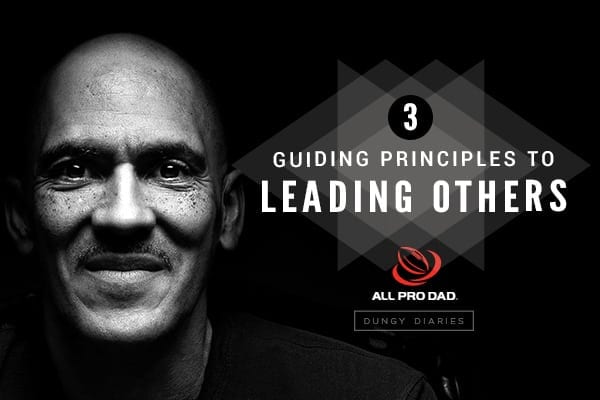If you were to ask Colt fans who the on-field leader of the team was when I coached, many would say Peyton Manning. Given that he was an All-Pro quarterback who led the offense, it makes sense and was certainly true. But what I observed during my years with the Colts is that we became a much better team, and a much better organization, when other players on the fifty-three man roster also stepped up alongside Peyton to take leadership responsibility.
Peyton Manning would be the first to tell you that his goal was not to be seen as the leader of the Colts. His goal was to win championships. Therefore, as Peyton led the team in the huddle and on the field, he also educated and helped his teammates. He knew that the more leaders there were on our team, the better off he and the Colts would be.
There are three guiding principles of leadership to create that act as the “goalposts” for the decisions and actions of our lives. These elements act as the guiding lights for our lives and the lives of the families and people we lead. Here are three things every leader needs to direct and guide what we do.
1. Vision
A leader’s job is to cast vision, to remind everyone of their common goals, and to give people an inspirational hook to hang on to so they won’t be tempted to give up when times get tough. Preserving the vision will sometimes depend entirely on faith -the hope of things not yet seen. At other times, we may have some objective evidence, no matter how small or incremental, that shows progress and thus keeps up moving forward. Keep the vision out front. Don’t let people quit early. And don’t you quit either.
2. Mission
A mission statement -whether it’s for an organization, institution, family, team, or individual- serves to answer a fundamental question: Why do we exist? In other words, why are we doing what we are doing? Why bother with all of this, anyway? Vision and mission are dynamic components of the direction God wants us to go. They will change over time as we are guided by God’s Word and by the disciples of our faith amid the changing needs in our society. If God wants us to retool, redevelop, or redirect our efforts, He will guide us in those new directions. If we have trouble hearing Him, He will faithfully work in our lives until we are pointed in the direction He wants us to go. First, cast the vision. Then establish the mission. Then get moving!
3. Values
The final component that guides any sound organization is its values. Values, very simply, can be thought of as the “rules of the road.” They tell us and others what is important to us- as leaders, as an organization, and as individuals. They are the rudder that steers the ship. They tell us how to treat other people, both inside and outside the team or organization. The values we adopt as leaders will paint a picture for others that is appealing and attractive, of someone they want to be associated with or not. Our values will determine how we as leaders approach, care for, and develop our mentoring relationships.
Taken as a whole, our vision, mission, and values tell the world who we are, what is important to us, and what guides our lives. They’re a snapshot of who we are and of the type of leaders we will be. Our values should clearly demonstrate that we are committed to the advancement and well-being of other people- those we are called to serve and lead.











